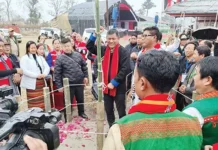[ Tongam Rina ]
When the state cabinet decided to adopt the Tibetan Rehabilitation Policy in August last, it probably had no idea that organisations and political parties would take such a hostile xenophobic stand.
Though there is nothing in the Policy that would dramatically change the economic status or otherwise of the Tibetan community living in the State or compromise the rights of the indigenous communities, the government should not have hurried. Instead, it should have consulted all stakeholders, including political parties and civil society organizations, before deciding to implement the policy. The move clearly was ill timed.
By rushing on the issue, the government has not only shot itself in the foot but has also exposed the dwindling Tibetan refugee community to intimidation and fear and angered a lot of Arunachalees.
The crux of the ten-point rehabilitation policy drawn up in 2014 by the Centre is that the State Governments have to sign a lease document with the Central Tibetan Relief Committee for the land currently being inhabited by the Tibetan refugees for a period of 20 years or till it is revoked/cancelled.
Lease document for the land is not giving away land. Instead it is securing the land, by recognising it as leased land.
Issuance of Rent Tenancy Certificate and grant of trade licenses are the other two that has to be done by the concerned State Governments.
Rent Tenancy Certificate has to be issued for all legal as well as revenue purposes, like it is being done for the scores of non-Arunachali businesses.
The issue of trade licenses to Tibetans needs to be explored as every non-indigenous person who has a business runs it on a Power of Attorney from an indigenous Arunachalee. The policy document is not very clear on the issue though it advises that Tibetans may be allowed to undertake economic activities.
Rests are advisories for implementation of centrally sponsored programmes and provision of basic amenities and jobs in private and NGO sectors.
If the state or its people feel that central policies are forcefully being made binding and some of it uninformed, there is always scope for discussion and changes can be consequently made.
For long, several organizations have claimed that people of Tibetan origin have been given AP Scheduled Tribe certificates. Getting such a certificate is a complex process and one has to go through several layers of screening right from Gaon Burah/Buri to Deputy Commissioner of a district. If any Tibetan has managed to get one, it is important to ascertain how that has happened and plug the administrative loopholes which allows grant of such certificates to people who do not belong to indigenous communities.
The brunt of the government’s recent decision is currently being felt in the capital complex with a section of students forcefully seeking documents from shopkeepers in various commercial establishments in the capital city, mostly in Takar Complex, Naharlagun. Though one understands the emotions, given the sheer number of refugees in the state and also confusing central government stands as well as court orders, such acts of intimidation are not only arbitrary, but illegal.
The hallmark of a tribal society is its fair treatment and informed judgment, not coercion or taking law into one’s own hands.





